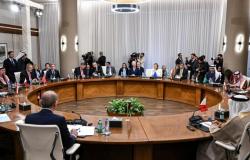US Secretary of State Antony Blinken said on Saturday that his country had established “direct contact” with Hayat Tahrir al-Sham (HTS), the Islamist group at the head of the coalition that seized power in Syria, leading to the fall of Bashar al-Assad.
• Also read: How did Bashar al-Assad flee Syria?
• Also read: In the ruins of the Assad regime, millions of captagon pills discovered
• Also read: Syria: new Israeli strikes on military sites, according to an NGO
Turkey, a major player in the conflict in Syria and support of the new authorities, has also reopened its embassy in Damascus after more than 12 years of closure.
Traffic police under the new authorities were deployed on Saturday to the streets of the capital, where municipal workers are cleaning the roads. Most businesses have reopened, including the famous al-Hamidiyé souk in old Damascus, according to AFP correspondents on site.
“We need to quickly revive activity in the souk,” says Amjad Sandouq, a trader. “The regime has fallen, but the State has not fallen, thank God.”
“Syrians themselves”
During an 11-day offensive launched from Idlib (north-west), a coalition of rebel factions led by the radical Sunni group HTS took most of the country, including Damascus, from government forces, ending a conflict on December 8. half century of power of the Assad family.
Led by Abu Mohammad al-Jolani, HTS claims to have broken with jihadism but remains classified as “terrorist” by several Western capitals, including Washington.
“We have been in contact with HTS and other parties,” Blinken told reporters in Aqaba, Jordan.
He did not give further details on the circumstances of these exchanges but when asked if the United States had had a direct link, he replied: “Direct contact, yes.”
Mr. Blinken specified that this contact was notably part of efforts to locate Austin Tice, an American journalist kidnapped in 2012 at the start of the civil war in Syria.
Mr. Blinken was wrapping up a regional tour that took him to Türkiye, Iraq and Jordan, countries neighboring Syria.
In Aqaba, Mr. Blinken participated in discussions bringing together Arab, European, Turkish diplomats and the UN special envoy for Syria Geir Pedersen, who agreed that the transition process must “be led (… ) by the Syrians themselves and achieve an inclusive, non-sectarian and representative government,” according to a joint statement.
Turkish embassy reopened
They further stressed that Syria, under international sanctions, finally had “the chance to end decades of isolation” and insisted on “the importance of fighting terrorism and extremism.”
Faced with the concerns of the international community, the new prime minister responsible for the transition until 1is March, Mohammad al-Bashir, had promised this week a rule of law and “guaranteeing the rights of all”.
Turkey, which welcomed the fall of Bashar al-Assad, reopened its embassy in Damascus on Saturday.
The chancellery closed in March 2012, a year after the start of the civil war in Syria, triggered by the repression of pro-democracy demonstrations and during which Ankara took up the cause of the rebels.
For a “pluralist” Syria
“United, united, united, the Syrian people are united,” has become the leitmotif of Syrians since Mr. Assad fled with his family to Russia.
But the jubilation is accompanied by the painful quest of Syrians who are looking for their loved ones who disappeared during the decades of repression by Assad, accused of the worst abuses.
Several armed groups and international powers have been involved in the war in Syria, which has left more than half a million dead, pushed some six million Syrians, or a quarter of the population, to flee, and fragmented and devastated the country.
Jolani, whose real name is Ahmad al-Chareh, for his part denounced the incursion of Israeli troops into the south of the territory after the fall of Assad but claimed that his country was too “exhausted” by the war to engage. in a new conflict.
Lebanese Hezbollah said it hoped that the new authorities would not normalize their relations with Israel, the sworn enemy of the pro-Iranian Shiite movement.
Israel carried out new strikes on “military sites of the former regime” in Damascus and its suburbs, destroying a scientific institute and a “military airport”, according to the Syrian Observatory for Human Rights (OSDH).
These raids aim to “destroy what remains of the military capabilities of the next Syrian army”, according to this NGO based in the United Kingdom but which has a vast network of sources in Syria.
In northeast Syria, the Kurdish-led and US-backed Syrian Democratic Forces (SDF) welcomed Assad’s fall.
While the Kurdish community was the victim of discrimination for decades during Assad’s rule, the leader of the FDS, Mazloum Abdi, called on Saturday on X the Kurdish parties to “participate in the construction of the future of a Democratic and pluralist Syria.
In western Syria, at least four fighters from a faction of the ruling coalition were killed in an ambush in a stronghold of the ousted president, according to the OSDH.



